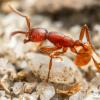I have recently come into acquisition of a species which is principally a nectarivore. I would like sound advice on sugar-based diets you have used to successfully maintained a species that is a nectarivore. These could be commercially available diets or ones that are 'home made' but NOT simply a sugar:water based mixture. For example have you found mixing specific fruit juices with water etc to be successful substitutes for actual nectar? Or have you ordered a pre-mix that has proven successful?
Thanks in advance for any and all constructive guidance!

















